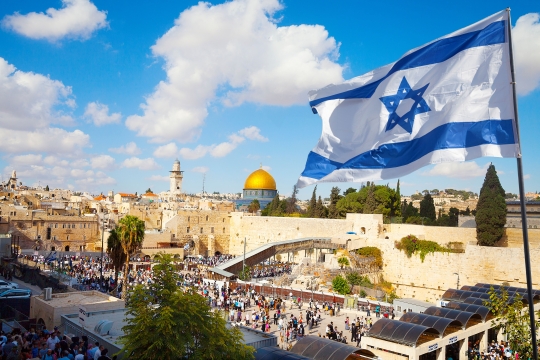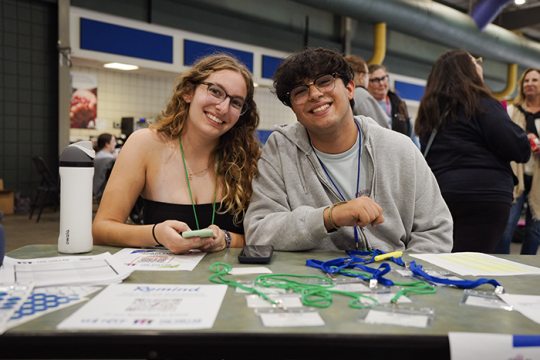
Photo by Theo Hansen
As we celebrate our 150th year, there are no subjects weighing more heavily upon us than our beloved Israel. So, let’s get to it.
On October 6th, the various tribes of modern Israel were embroiled in a loud, boisterous, and public debate about the very foundations of our Jewish and democratic homeland. Israel was literally coming apart at the seams as 10 months of heated protests and counter-protests related to the government’s effort to overhaul the judiciary divided the country more than ever in its 75 years. And then the unimaginable happened on October 7th.
That excruciating day will be remembered for the rest of Jewish history. As happened at deadly times before, the brutal attack quickly stitched our people back together. In Israel and diaspora communities worldwide, the right-left, orthodox-reform-secular, rich-poor, and Ashkenazi-Mizrachi-Sephardi divides were fused together in the face of an existential war to protect our historic homeland.
The war has also made Jewish life in North America, and around the world, more dangerous. The old paradigms of Israel and the Diaspora have become outdated. Antisemitism threatens Jewish life even within North America’s strong democracies, while Israel’s powerful military and globally vaunted start-up nation failed to keep Israelis safe.
Diaspora influence on the policies of nations, particularly in the U.S., is more essential than ever to Israel’s security and well-being. At the same time, as we pray for Israel’s safety, Israelis are deeply distressed by the dramatic rise in global antisemitism, including here in North America. Today, our lives, though oceans apart, are indisputably and inexorably bound together--now and in the future.
Parashat Mikeitz provides guidance for moving from being a people deeply divided to being deeply connected. We all know the story. Years earlier, Joseph’s brothers so hated their precocious, favored, and brilliant brother that they were willing to kill him, or at least sell him into slavery, or, to use the language of this moment, allow him to be taken hostage.
Mikeitz recounts Joseph’s brothers having to leave the land of Israel because famine forced them down to Egypt to acquire rations. From the start, the Promised Land comes with many existential challenges. The main drama of Mikeitz is the deep division among siblings.
Unknowingly, the brothers meet up with their brother, Joseph who is, this time, the second-most-powerful figure in Egypt. After very tense and dramatic interactions with their brother, whom they presumed dead or lost, they not only acquire grain but, even more importantly, the rift between them is healed in next week’s parashah, Vayigash.
Mikeitz captures the interdependence of ancient Jewish life between those living in the land and those who dwell outside it. For much of the last 75 years, especially in Israel and North America, we’ve lived with the illusion that our Jewish communities were self-sufficient and secure, but no more.
A few years back, Israel’s then-president Rubi Rivlin described Israel as a country of four tribes: Israeli Arabs, Haredim (ultra-Orthodox), Religious Zionists, and Secular Zionists. Since we had grown close, I remember sitting in his office in Beit Hanasi (a little chutzpah, what's a rabbi without a little chutzpah?) suggesting that non-Orthodox religious Jews in Israel constituted a fifth tribe. He smiled but he wasn’t persuaded. Today I’d argue that, in addition to my point being more valid than ever given the growth of non-Orthodox movements -- especially our inspired Israeli Reform community -- if that's not an argument for an extra tribe, I don't know what is. But I also suggested, in this moment, that the entire Diaspora constitutes at least one more modern tribe of Israel. This matters because we need better conceptual models to describe the way we are bound together, even as we are profoundly different in the way we understand and live Jewish lives.
Joseph and his brothers became the founders of the ancient 12 tribes of Israel. It’s not that the tribes lived in blissful harmony -- oh no, there was constant tension -- but when times of crisis arose and Israel was threatened, the elders of the tribes joined together in shaping unified responses and forging a common defense.
Nineteenth-century Reform Jewish leaders prioritized the “universal” commitments of Judaism over the tribal obligations of caring for the Jewish people. Following Enlightenment thinkers, they gave preference to humanity over tribe, believing that doing so would hasten the coming of a world overflowing with justice, dignity, and rights for all.
That universalism was compelling, but as the history of our people these past 150 years so powerfully testifies, universalism is healthiest when counterbalanced with particularism.
Would it not be natural for each of us to protect our families before strangers? If you were sitting on an airplane between your child and someone else’s and the oxygen masks dropped down, of course you’d put yours on first, then your child’s, and only then would you help that stranger’s child. Is that the result of stunted morality or a healthy bond to our nearest kin? Too many contemporary Jews have lost the deep bond with our Jewish family.
Over the last weeks, our Jewish community has struggled with how to strongly support our bereft siblings in Israel while also expressing empathy for the suffering of innocent Palestinians. Yes, the horrific death toll of innocent lives is a tragedy. Hamas slaughtered 1200 members of our family in their homes -- so many burned alive, mutilated, and raped; many more wounded and maimed; and others abducted. It is our Jewish and moral responsibility to hold Hamas responsible for those 1200 deaths and the deaths of Gazan civilians that they use as human shields. And at the same moment, we can also agonize over the innocent Gazan deaths and suffering. Doing so strengthens both our Jewish solidarity and our moral integrity.
Israelis and supporters of Israel like us – indeed, even Israel’s foes -- have the right to object to politicians and policies of the Israeli government. But Hamas was not acting out of any form of self-defense or in protest of a policy. Their oft-repeated goal is clear: to wipe Israel off the map and kill as many Jews as possible.
On my recent trip to Israel after October 7th, I met with survivors of the barbaric attack on the communities along the Gaza border with whom we, as a Movement, are so incredibly close and interconnected. These survivors are among the most liberal Israelis and are committed to peace and coexistence with Palestinians; yet I didn’t hear one person among these peace activists question the imperative that the IDF must eliminate Hamas’ military capacity and governance of Gaza if Israelis are ever to live securely.
On the day after this war is over -- and we pray that all of the hostages are returned home -- we must not accept that loving Israel means having to support all of its government’s policies. One can love the State of Israel and strongly oppose its government’s policies. Kal v’homer, to use a distinctly Talmudic term, how much the more so must we oppose the policies of the most extreme government in Israel’s history?
As Ariel Sharon, the former general and right-wing prime minister, said in 2003: "You cannot like the word, but what is happening is an occupation – to hold 3.5 million Palestinians under occupation." Continuing with Ariel Sharon's words, "I believe that is a terrible thing for Israel and for the Palestinians.” Today, if you utter the word “occupation,” you’re considered not to be any longer an Ohev Yisrael -- truly pro-Israel. The issue isn’t whether Israel occupies the West Bank, it clearly does. The critical question is how to end it. Asking Israel to evacuate the lion’s share of the West Bank without a final status agreement between Israel and the Palestinians would be disastrous and it would be deadly. But without a diplomatic resolution with which both Israelis and Palestinians can live -- Israel will never end the occupation, and never be safe and secure.
The Two-State Solution remains the most responsible way to end that occupation. Though in the midst of the current war, it feels like an increasingly remote possibility. Yet as we contemplate the “day after the war,” it is still the best option for ending the untenable status quo. Watching the current government give a green light to the de facto annexation of the West Bank while tolerating or even encouraging extremist settlers’ violent attacks on Palestinians that fuels more anti-Israel sentiment in the West Bank and around the world makes Israelis less safe and suggests to the world that Israel is at war with the Palestinian people, not just with Hamas.
The Biden administration has been extraordinarily supportive of Israel’s just war to defeat Hamas’ threat to Israel. The U.S. administration has reiterated that to prevail, Israel must continue its war against Hamas – but urges it to do so with fewer civilian casualties and without shutting off humanitarian aid, even as Hamas relies on those casualties to increase their global support. If the northern front with Hezbollah heats up, pushing Israel into a two-front war against Iran-backed military forces that have vowed to destroy Israel, the threat level to Israel will dramatically increase.
For Israel to defend herself and to deter further escalation of the war from Iran-connected entities, we strongly support the passage of the Israel portion of the supplementary aid package from Congress which would also include critical support for security grants to Jewish institutions like congregations from a dramatically increased fund of $1 billion in the U.S.
In the meantime, we must continue to stand shoulder to shoulder with Israelis fighting for their lives to defeat Hamas' military and political strength, and enhance the prospects for the safe return of the hostages.
Many of the young Jews in our Movement have taken courageous pro-Israel positions on their university campuses, within their social circles, and in the social justice causes they work on, yet we must also acknowledge a significant number of younger Jews are struggling with the humanitarian disaster the civilian population in Gaza is facing and with America's, the American Jewish community’s, strong support of Israel’s prosecution of the war. Indeed, I'm certain that many of us here today are likewise conflicted. This is true, I suspect, in even higher proportions among politically progressive Jews, and Jews of Color, segments of our community which move in multiple communities, that are wrestling with competing moral truths. I've heard stories -- you probably did as well -- of Thanksgiving and Hanukkah table talk about the war that caused intense generational arguments. My hope is that we can remain strong in our support of Israel but not cut off our younger Jews, including those within our own families and in our synagogues, with whom we need to stay in relationships, because we love them.
They wrestle with these complex moral issues drawing on the justice and equity values they learned through their Jewish upbringing that we nurtured in them. Many of them offer principled, thoughtful arguments for their views of the war. As the largest North American Zionist Movement -- could you just feel the strength of that sentence? Do you know who is the largest, strongest Zionist Movement in North America? I'm looking at that Movement, and why don't we stand as tall as that statement requires? It requires not only strength, but courage, particularly in this moment. Our job at this moment is to continue to make the case for Israel’s just war against Hamas while at the very same moment, staying focused on reducing innocent civilian casualties and making sure that humanitarian aid reaches the people of Gaza. This is inherently challenging given Hamas’ chokehold on the Gazan people and all aspects of life there.
When the war in Gaza is over -- please God, let it be over, karov biyamenu, ASAP, as my teacher told us today -- when it is over, Israel will have the monumental task of rebuilding not just the communities along the Gaza border and the shattered lives of the families of the 1200 murdered, nearly 7,000 wounded, the hostages, and the families of the fallen and wounded soldiers; but also the trust of its people in the governmental institutions that failed to protect them and to take care of them on October 7th. The current government has lost the trust of most of the Israeli people, who have remarkably put aside their grievances to band together to defeat Hamas and fill the vacuum left by the government with the extraordinarily massive volunteer efforts of civil society. But the day of reckoning will come, and it will come soon.
Our Movement here and in Israel has been, and remains, critical of the policies of this government which have frayed Israel’s social cohesion, fomented deep divisions, and weakened the institutions of Israel's democracy.
The protest movement that grew over the last year represents one of the most remarkable examples of peaceful protest in the history of democracy and can serve as the foundation for the Israel we must rebuild in the coming years. The leaders of the protest campaigns, with whom our own Movement is in close relationship, are responsible for so much of the inspiring volunteer response to the pain and loss of this brutal war. They will be key to shaping a better tomorrow for all of Israel’s citizens, and we will be ready to do our part as well. Israel: thank you.
I notice it got quiet when I said, "We'll be there as well." The strongest Zionist Movement in North America is not going to be quiet about that. No, when they call us, we're going to answer, because that's what we do. It's not like that's just some country in the Middle East.
No, my friends, Israel is family to us, and our family is still living through one of the most traumatic periods in its 75 year history. Make no mistake about it, the modern State of Israel remains one of the greatest miracles in all of Jewish history, a nation to which, like America, large segments of its population moved for a noble purpose: In Israel's case, to create a land of freedom, opportunity, safety, and security, for the ingathering in the exiles in the form of a building up and a democratic and Jewish state in the 3,000-year-old historic homeland of the Jewish people. You got a sense that this was not a "colonization" - you got that? That's an important detail to carry away with us. A 3,000-year homeland. We didn't just pray about that land, every single day, three times a day through the millennia of the Diaspora. We were there. Our roots, the foundations of our praying places -- no, friends, we are a part of that land, and it is part of us.
The fates of Israel and the global Jewish community are, indeed, bound together. We will not forsake those bonds, nor will we forsake our prophetic imperatives that the Jewish people, whether in our Jewish state or Jewish communities anywhere, maintain solidarity in our commitment to be an or l’goyim, a light to and of the nations furthering equity, justice, and peace for all God’s children. That's true here, that's true there, that's true everywhere. So, when some people are not living in the dynamic tension, they only have one piece of the puzzle: they only have the universal, or there are others who only have the tribal. We say those were meant to be in permanent dynamic tension. That's what Jewish life is about. That's why this movement, and this moment, is so incredibly challenging. But we will not shrink from holding all of those competing truths, not casually, but deeply, in not just this moment -- but in the days and weeks and months and years ahead.
For the safety and security of our people, and for that holy purpose of making God’s vision of justice and peace real on earth. For both, truly:
Am Yisrael Chai -The Jewish People lives.
Related Posts

Faith, Justice, and Israel: Being Proud

Leadership Boot Camp: A Clean Page, Infinite Possibilities

